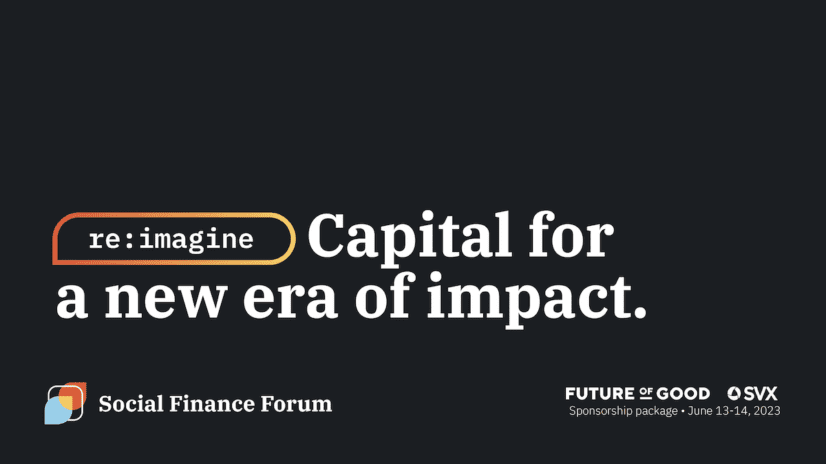Advisory Sessions used to build SFF2023
Summary – SFF 2023 Advisor Roundtables
Changemakers from coast-to-coast-to-coast are reshaping the purpose of and their relationships with capital. The renewed lens of advancing social finance in Canada is one that centres anti-racism, gender equity, intersectionality, reconciliation and decolonization, and social, climate and intergenerational justice. Incorporating this lens, the renewed purpose of the Social Finance Forum is to grow the impact of the social finance movement in Canada through ecosystem building, education, content, journalism and storytelling, co-creation, convening and connecting the community.
In designing this year’s Social Finance Forum, SVX and Future of Good surveyed and hosted five consultation sessions with 45 stakeholders from across the impact investment sector to share their input on multiple aspects of the Social Finance Forum. In the spirit of greater transparency and accountability, we are pleased to share the collective feedback from the advisors here.
The advisors we engaged with included funders and investors, direct and systems intermediaries, and community organizers and innovators from across Canada*. We wished to learn from the advisors on a number of topics, including:
- What are the guiding principles we should account for in designing the Social Finance Forum?
- What are the goals to be achieved by the Forum?
- Who is the intended audience of the Forum?
- Which formats would drive the best learning experience?
- What content themes would you like to see explored?
Guiding Principles of the Social Finance Forum
We presented the following principles for reaction and feedback from the advisors:- From exclusive to inclusive: Every changemaker must feel like they belong, can access the programming where they live, and that their work and curiosity is valued.
- From talking shaping: Insights from the stage are valuable, but how these insights are used to shape interventions matter more
- Bay Street and Community: Finance is everywhere, not just in downtown Toronto. Every community is contributing to the reimagining of finance and is worthy of participating.
- From small programs to systemic change: There is a ton to learn from projects of all kinds but the forum will emphasize and showcase deeper, more meaningful experimentation with an eye to systematic change.
- From return-centric to equity centric: Finance has multiple forms of return on investment. The forum will highlight how capital is used to advance justice and equity.
Goals
We heard from the advisors that the key goal of the Forum should be to (re)connect folks from across the social finance space to share ideas and approaches to achieve greater impact, to elevate community voice, to center equity and justice, and to create a deeper understanding of how social finance works. The focus should be on creating a truly inclusive social finance marketplace with participants from all sectors working across Canada which would play a role in building the social finance movement across Canada and understand how social finance would be most relevant and impactful in our new reality.Intended Audience
The advisors identified a number of audience groups they would like to see represented at the Forum. We heard that a cross-sectoral approach needs to be adopted as all members of the ecosystem are needed in such discussions. The audiences identified range from investors and funders (venture capital, philanthropy, foundations, credit unions, banks, high net worth individuals, and beyond), social entrepreneurs and demand-side actors, intermediaries and service providers. One key consideration is the size and scope of the content. There is a notion that if we cast too wide of a net, we miss the opportunity to provide useful content to those who would really benefit from deeper discussion. At the same time, we want to be able to convert the unconverted, mobilize and push those from various corners of the ecosystem, and acknowledge the varying learning needs of those from the introductory level to those from the advanced level. In order to accommodate a broad range of audiences, content streaming should be made available so participants can opt for the content which aligns with their needs and interests. As part of our drive towards greater equity and inclusion, it’s critical to engage and amplify equity-deserving groups and the important work that they are doing in the space, including (but not limited to) those from rural and remote communities, young people working in the space, and Black and Indigenous innovators and investors.Forum Experience & Format
The format of the Social Finance Forum was widely discussed by the advisors,as folks were curious how we are adapting the Forum to a post-COVID world. The format of the Forum will be key to ensure access, provide opportunities for networking and experiential learning, and global connectivity and knowledge exchange. There is mixed reception to a proposed hybrid format (mixed in-person and virtual programming.) A hybrid format offers greater accessibility, decentalization, and options for self-selected content experience, but requires a large amount of planning and can go awry if not done in a thoughtful and well-integrated way. It was emphasized that the in-person forum experiences should not just be based in Ontario, but should facilitate conversations across Canada. There is a clear need for networking and connectivity opportunities in the Forum, to build connections from various corners of the ecosystem in a post-COVID setting. The Forum has long been an opportunity to connect unlikely allies, and should be an environment that fosters community and builds empathy in relationships. We were also encouraged to think beyond the traditional confines of conferences — experiential learning should be included at the Forum, whether it be off-site tours, mock investments, live pitch sessions, debates, and other fresh mediums for knowledge exchange.Content themes
A number of important and boundary-pushing topics surfaced as discussions that the ecosystem would like to explore. While we will certainly curate conversations around the usual thematics (e.g., food, climate, housing, place-based, etc.), we were also encouraged to think beyond them. Some of these topics include:- Rethinking social finance (for example, identifying and overcoming barriers to the impact investment space; going beyond ESG; two-way dialogue between capital demand and supply)
- Equity, Inclusion, Decolonization, Justice, Power Shifting (for example, the growing Indigenous economy; community and locally rooted investing; scaling and validating diverse intermediaries, wholesalers, and entrepreneurs)
- Social finance tools and trends (for example, update on the state of social finance in Canada; finance vehicles and tools such as SIBS, flexible debt, employee-ownership; retail investing; the Social Finance Fund and Investment Readiness Program)
- International knowledge exchange (for example, how social finance practices are evolving globally; learnings from peers in other countries; the role of Canadian stakeholders in addressing global challenges)

